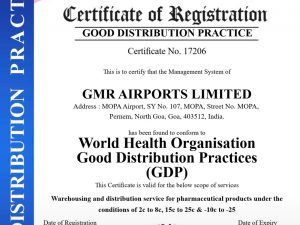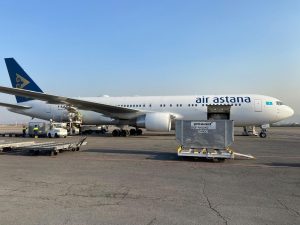Vipin Vohra, Chairman, Continental Carriers said, “Building warehouses near airports is crucial to decongest terminals, streamline cargo handling and enhance supply chain efficiency. With cargo volumes set to rise under the ‘Make in India’ initiative, well-equipped airport-adjacent warehouses are essential for faster clearance, reduced dwell time, and seamless multimodal connectivity. To encourage larger participation, the government should incentivize such developments, ensuring greater investment and enhanced trade competitiveness in India’s growing logistics sector.”
Read More »‘It will enhance supply chain efficiency & support multimodal connectivity’
C K Govil, CMD, Activair Airfreight said, “Building warehouses near airports is essential to decongest cargo terminals and streamline logistics operations. Proximity to airports ensures faster clearance, reduced turnaround times, and lower transportation costs. This infrastructure will enhance supply chain efficiency, support multimodal connectivity, and improve India’s global trade competitiveness. A well-planned airport warehousing ecosystem will also attract investments, boost employment, and facilitate ease of doing business for the logistics and air cargo industry.”
Read More »‘Warehouses in close proximity of airports may reduce congestion, enhance cargo movements’
Sunil Kohli, Managing Director, Rahat Cargo said, “It is abundantly clear that location of the warehouses in the close proximity of the respective airports can go a long way in eliminating the congestion elements which keep frequently emerging due to the bunching of several flights during a particular time slot. Although many such warehouses have lately been built at the metro airports by the freight forwarders yet a need is further felt essential to have more of such warehouses established at strategic locations near the airports which may be conveniently utilised by the exporters thereby having an optimal usage of the manpower apart from saving time. It’s also advisable to have such ideally located warehouses close to all the non-metro airports which handle considerable cargo movements.”
Read More »‘High cost of land & infrastructure in urban areas near airports is a challenge’
Kamal Jain, Director, Cargomen Logistics said, “Warehouses near airports or producing and storing goods close to consumption centres’ is ideal for reducing cycle time, transportation costs and enhancing responsiveness to customer demand. However, the high cost of land and infrastructure in urban areas that to be airport vicinity often discourages businesses from setting up facilities nearby. As a result, many opt for distant, more affordable locations. While this may reduce upfront expenses, it can increase fuel costs, delivery times, and compromise service levels. A comprehensive, data-driven cost-benefit analysis—considering opportunity costs, delivery speed, manpower, fuel, and evolving customer expectations—can uncover valuable insights. In many cases, investing in facilities closer to the consumption point, despite higher real estate costs, results in faster turnaround, improved customer satisfaction, and a competitive edge. Strategic proximity often pays off in the long run.”
Read More »‘Proximity to airports reduces transit times, lowers costs & enhances EoDB’
Jalpa H Vithalani, Director, Global Aviation Services said, “Building warehouses near airports is essential to alleviate congestion and streamline logistics operations, significantly improving the speed and efficiency of supply chains. Proximity to airports reduces transit times, lowers costs, and enhances overall ease of doing business, benefiting both domestic and international trade.”
Read More »GMR Goa Air Cargo ( GOX) is now GDP certified
SAS Cargo, Cargo.one unite to boost digital freight bookings
SAS Cargo partners with cargo.one to expand its digital freight procurement offering and meet the evolving needs of supply chain professionals seeking better automation, logistics coordination and procurement transparency. The partnership gives freight forwarders the ability to quote, book and track SAS Cargo air freight shipments in real time, bringing a new level of speed and control to logistics operations. The integration begins in April 2025 and connects forwarders with SAS Cargo’s air freight capacity via cargo.one’s platform. This covers general cargo and temperature-controlled shipments up to 10,000kg and includes major trade lanes across Asia, EMEA and North America. Popular destinations such as London, New York, Frankfurt, Atlanta and Tokyo are all included.
Read More »Jettainer and Air Astana continuing successful partnership
Air Astana is continuing to rely on Jettainer’s expertise in Unit Load Device (ULD) management. This longstanding partnership between the global leader in ULD management services and Kazakhstan’s national airline, headquartered in Almaty, that began in 2007, has been renewed again on a long-term basis. Air Astana’s ULD needs will change in the coming years due to its planned fleet modernization with the introduction of Boeing 787 aircraft. Jettainer will continue to partner closely with the airline as it takes this step and supports it with customized solutions. Air Astana is focusing on growth. The Kazakh airline plans to increase its fleet from 60 to 80 aircraft, including Boeing 787 Dreamliners, by the end of 2028. The planned fleet change will result in a growing and diversified ULD fleet. Jettainer will provide comprehensive support and expertise during the transition. By working with Jettainer, Air Astana will not only benefit from a dedicated ULD fleet but also from efficient ULD management. This will ensure smooth operations and contribute to seamless tracking and monitoring of ULD movements, leaving Air Astana to focus fully on its core business. Berik Abdrakhmanov, Director Ground Services at Air Astana, commented, “We have been working very well and closely with Jettainer for more than 18 years. We are confident that Jettainer’s team of experts will continue to help us achieve our growth plans with the innovative and customized ULD services we need to make them happen.”
Read More »Industry meet to discuss global air cargo issues & trade
The National Symposium which took place on 27 March 2025, focusing on the role of air cargo in modern logistics and global trade. The two day programme was inaugurated by Neeraj Kumar, Director (International Regulations and Legal Affairs), DGCA. He provided valuable insights into air cargo logistics operations in India. The session was presided over by Dr. Malini V. Shankar, IAS (Retd.), Hon’ble Vice-Chancellor, IMU, along with the esteemed presence of RAdm (Dr) P J Rangachari (Retd.), Director, IMU Chennai Campus. The panel discussion focused on air cargo, a vital sector in global trade. This session featured industry experts who shared valuable insights into the air cargo industry’s challenges, trends, and innovations. It offered students a unique opportunity to interact with seasoned professionals, gain knowledge about global logistics, and understand the evolving dynamics of air transportation providing an enriching experience for anyone interested in logistics, business, or transportation. The keynote address was delivered by Tulsi Mirchandaney, Managing Director (Retd.), Blue Dart Aviation Ltd., Chennai, who discussed the growth of the air cargo sector, its impact on global supply chains, and the role of technology in driving efficiency and sustainability. Panel Discussion focused on Optimising Global Supply Chains – The Integral Role of Air Cargo in Modern Logistics. These luminaries from the industry covered gamut of topics, such as innovations in air cargo logistics and strategies for improving supply chain efficiency, infrastructure development and investment in air cargo handling facilities, application of AI and data analytics in air cargo operations, the precautions to be taken while transporting hazardous materials, the integrative role of air cargo transportation in the global supply chain management, etc.
Read More »IATA promotes SAF Registry plans
IATA is continuing to develop plans for its Sustainable Aviation Fuel (SAF) Registry to support air cargo companies and other aviation stakeholders in their decarbonisation efforts. IATA has established the Civil Aviation Decarbonization Organization (CADO) to manage its SAF Registry when it is released. CADO is incorporated as a not-for-profit organisation in Canada with its headquarters in Montreal. IATA is the founding member of CADO and its role in CADO will include ongoing technical support and operations. CADO membership is open to organisations that operate in or contribute directly to the SAF value chain, or that represent any association or group of participants in the SAF value chain; states or quasi-state organisations with a direct interest in the operations and benefit of the SAF Registry; and related interest groups indirectly benefitting from SAF deployed in the aviation system.
Read More » Cargo Breaking News
Cargo Breaking News









